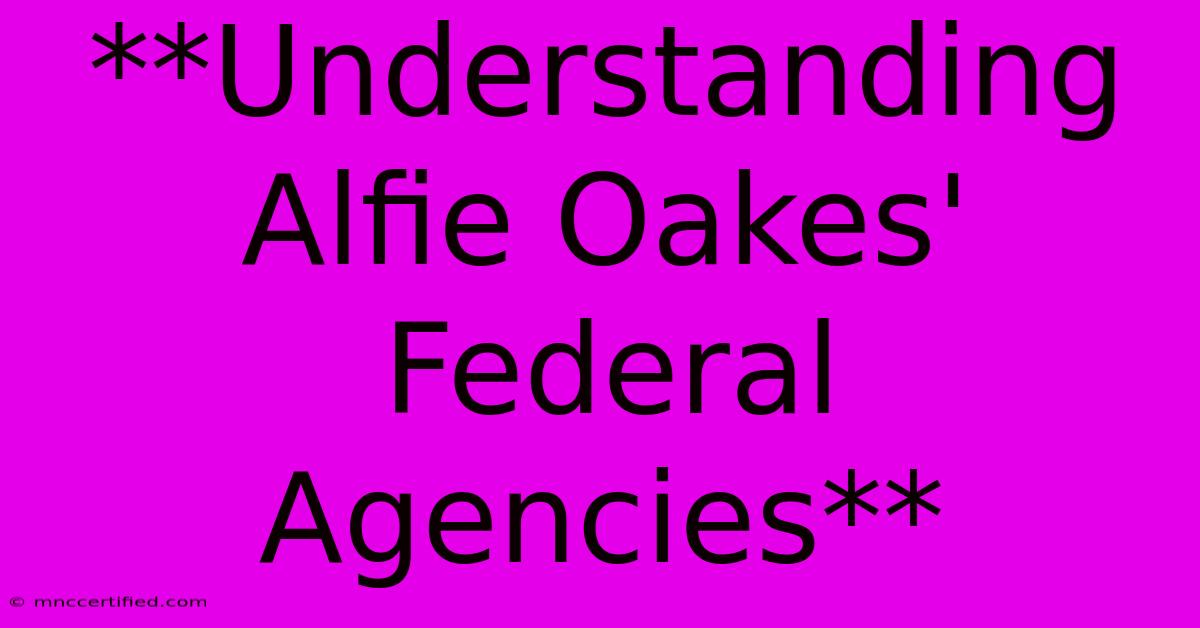**Understanding Alfie Oakes' Federal Agencies**

Table of Contents
Understanding Alfie Oakes' Federal Agencies: A Deeper Dive into the Controversial Figure
Alfie Oakes, a controversial figure in the health food industry, has become known for his outspoken views against government agencies, particularly those related to food and health. His stance has sparked heated debates and raised questions about the role of federal agencies in regulating food safety and public health. This article aims to provide a comprehensive understanding of Oakes' views on various federal agencies and the complexities surrounding his controversial stance.
Oakes' Stance: A Focus on Freedom and Individual Choice
At the heart of Oakes' argument lies a belief in individual liberty and the right to choose what one consumes. He vehemently opposes what he perceives as government overreach in regulating food, often claiming that agencies like the Food and Drug Administration (FDA) are unnecessarily restricting access to "natural" and "healthy" options. His stance extends to other agencies like the Environmental Protection Agency (EPA), accusing them of hindering the use of certain agricultural practices he deems beneficial.
Oakes frequently utilizes terms like "Big Government" and "Government Overreach" to illustrate his belief that federal agencies are actively working against the best interests of consumers. He positions himself as a defender of "natural" and "organic" food choices, arguing that the government is attempting to stifle these alternatives through regulations and restrictions.
The FDA: A Primary Target of Criticism
The FDA has been a primary target of Oakes' criticisms, often facing accusations of being influenced by large corporations and hindering the availability of "healthy" alternatives. Oakes highlights instances where the FDA has banned or restricted certain food additives and supplements, often framing these actions as attempts to stifle competition and limit consumer choice.
However, the FDA's role extends beyond regulating food additives. The agency is tasked with ensuring food safety, protecting public health, and regulating the manufacturing and distribution of food products. Its regulations are designed to protect consumers from harmful contaminants, adulteration, and mislabeling, ultimately aiming to prevent foodborne illnesses and protect public health.
The EPA: A Focus on Pesticides and Agricultural Practices
Oakes' criticism extends to the EPA, often targeting its regulations regarding pesticide use in agriculture. He argues that the EPA's stringent restrictions on certain pesticides limit the use of effective and "natural" pest control methods, ultimately impacting agricultural productivity and driving up food prices.
The EPA's role, however, goes beyond regulating pesticide use. It is responsible for protecting human health and the environment from the adverse effects of pollutants and hazardous waste. The agency strives to establish safe limits for pesticide residues on food, ensuring that these chemicals do not pose a threat to human health.
The Controversy: Balancing Freedom and Public Health
Oakes' criticism of these federal agencies raises important questions about the balance between individual freedom and public health protection. While the right to choose one's food is fundamental, the government's responsibility to ensure public safety and prevent harm cannot be disregarded.
The debate surrounding Oakes' views highlights the complexities of food regulations and the need to find a balance between protecting consumer choice and ensuring public health. It raises questions about the influence of large corporations on regulatory decisions, the role of scientific evidence in policy-making, and the effectiveness of current regulations in achieving their intended goals.
Conclusion: A Complex Landscape of Debate
The controversy surrounding Alfie Oakes' views on federal agencies highlights the ongoing debate about the role of government in regulating food and protecting public health. While his stance emphasizes individual liberty and challenges existing regulations, it is important to consider the broader context of public health protection and the potential consequences of unfettered access to potentially harmful substances. Ultimately, navigating this complex landscape requires a careful consideration of all sides of the issue and a commitment to finding a balanced approach that protects both consumer rights and public health.

Thank you for visiting our website wich cover about **Understanding Alfie Oakes' Federal Agencies**. We hope the information provided has been useful to you. Feel free to contact us if you have any questions or need further assistance. See you next time and dont miss to bookmark.
Featured Posts
-
Lurie Wins San Francisco Mayoral Race Outlines Priorities
Nov 09, 2024
-
Above Ground Pool Bonding Requirements
Nov 09, 2024
-
Blackrock Target Income Bond Portfolio
Nov 09, 2024
-
Milady Meme Coin Price Prediction 2050
Nov 09, 2024
-
Dwp Christmas Bonus Benefits List And Payment Dates
Nov 09, 2024